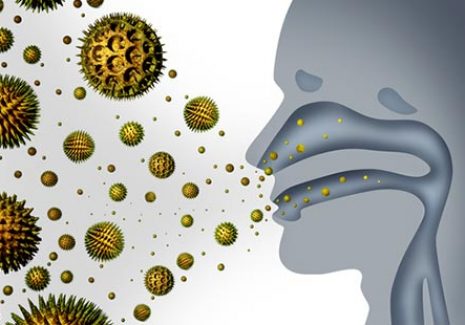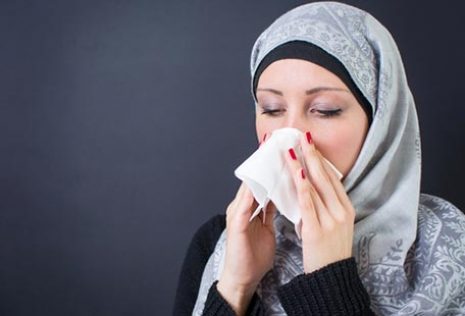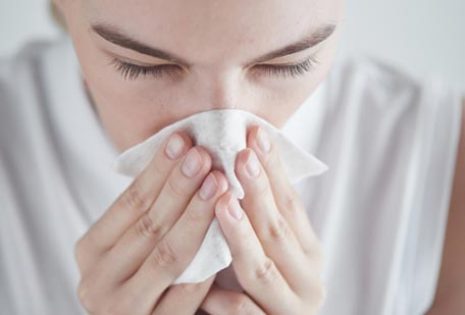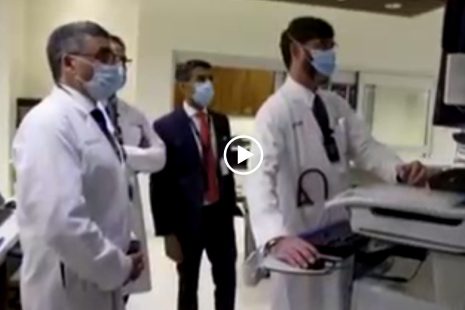Allergy & Clinical Immunology

 Introduction
Introduction
Allergies are among the most common chronic conditions worldwide, and are immunological hypersensitivities that can lead to a variety of different diseases. This page aims to provide reliable information about allergy and other immune diseases for patients, carers and the community.
Click on any of the conditions to learn more about what they are, their symptoms, causes and treatment.
There are several diagnostic tests can help identify the types and causes of allergic diseases, one of them is called Skin prick testing (SPT), click here for more information.
 Rhinitis (Nasal Allergies)
Rhinitis (Nasal Allergies)
Rhinitis (Nasal Allergies) is the inflammation of nose in response to irritants and allergens (substances that provoke allergic response) that can enter the nose. Your immune system respond to these allergens by releasing histamine and other chemicals that are responsible for the symptoms in the nose, throat, eyes, ears, skin and roof of the mouth.

 Types of Rhinitis
Types of Rhinitis
 Allergic Rhinitis
Allergic Rhinitis Seasonal Allergic Rhinitis (Hay-Fever)
Seasonal Allergic Rhinitis (Hay-Fever) Perennial allergic Rhinitis
Perennial allergic Rhinitis Non-Allergic Rhinitis
Non-Allergic Rhinitis Infectious Rhinitis
Infectious Rhinitis
 Symptoms of Rhinitis
Symptoms of Rhinitis
 Itching in the nose, throat, eyes, roof of the mouth
Itching in the nose, throat, eyes, roof of the mouth Runny nose
Runny nose Tearing eyes
Tearing eyes Dark circles under the eyes
Dark circles under the eyes Stuffy nose (congestion)
Stuffy nose (congestion) Sneezing
Sneezing

 Treatment of Rhinitis
Treatment of Rhinitis
 Antihistamines
Antihistamines
Taken by mouth or as a nasal spray. They can relieve sneezing and itching in the nose and eyes.
 Decongestants
Decongestants
Taken by mouth or as a nasal spray or drops. They help shrink the lining of the nasal passages which relieves.
 Nasalcorticosteroids
Nasalcorticosteroids
Ued in a nasal spray form. To reduce inflammation in the nose and block allergic reactions. They are the most effective medicine type for allergic rhinitis.
 Leukotrienereceptor antagonists
Leukotrienereceptor antagonists
Block the action of important chemical messengers other than histamine that are involved in allergic reactions.
 Cromolyn sodium
Cromolyn sodium
Is a nasal spray that blocks the release of chemicals that cause allergy symptoms, including histamine.
 Rhinosinusitis (RS)
Rhinosinusitis (RS)
Rhinosinusitis (RS) is defined as inflammation of the sinuses and nasal cavity. RS is classified based on duration of symptoms and inflammation into: Acute rhinosinusitis (ARS), Recurrent acute rhinosinusitis (RARS), and Chronic rhinosinusitis (CRS).

 Symptoms of RS include
Symptoms of RS include
 Facial pressure and pain
Facial pressure and pain Nasal Congestion
Nasal Congestion Post nasal drainage and purulent rhinorrhea
Post nasal drainage and purulent rhinorrhea Fatigue
Fatigue
 Treatment of Rhinosinusitis
Treatment of Rhinosinusitis
 Treatment of Acute Rhinosinusitis
Treatment of Acute Rhinosinusitis
- Supportive therapy with analgesics and nasal saline irrigation for symptomatic relief.
- Topical intranasal steroids.
- Antibiotics are recommended if symptoms of rhinosinusitis last longer than 10 days.
- Surgical intervention may be required when there is a risk of complications in the brain.
 Treatment of Chronic Rhinosinusitis
Treatment of Chronic Rhinosinusitis
- Topical intranasal corticosteroids are recommended to decrease inflammation.
- Short-term oral corticosteroids.
- Saline nasal irrigation.
- Antibiotics are used for acute exacerbations of CRS.
- Surgical Intervention might be required for patients who fail medical therapy.
 What is an Allergy Skin Test?
What is an Allergy Skin Test?
 An Allergy skin test is a test used to diagnose certain allergies. The test can show which substances (allergens) are causing your allergic reaction.
An Allergy skin test is a test used to diagnose certain allergies. The test can show which substances (allergens) are causing your allergic reaction. Allergy Skin test looks for reactions to specific allergens (such as pollen, dust, molds, and medicines as penicillin) that are placed on the skin.
Allergy Skin test looks for reactions to specific allergens (such as pollen, dust, molds, and medicines as penicillin) that are placed on the skin.
 If you have any symptoms such as
If you have any symptoms such as
- Sneezing
- Wheezing
- Itchy watery eyes
- Rash with raised red patches (Hives)
- Coughing
- Your healthcare provider may order allergy skin testing
 DO’s and DON’Ts
DO’s and DON’Ts
 Asthma can’t be cured, but its symptoms can be controlled. Because asthma often changes over time, it’s important that you work with your doctor to track your signs and symptoms and adjust treatment as needed.
Asthma can’t be cured, but its symptoms can be controlled. Because asthma often changes over time, it’s important that you work with your doctor to track your signs and symptoms and adjust treatment as needed.
The key to living with asthma successfully is to keep it under control. Limit contact with asthma triggers in your environment, monitor your condition with a peak flow meter, and follow your treatment plan strictly.
Work on reducing asthma triggers. A first step is to stop smoking and protect yourself second-hand smoke in your home and in public places.
It is possible to be active and stay healthy when you’re living with asthma. In fact, many medal-winning Olympic athletes have asthma. Exercise strengthens your respiratory muscles, helps maintain weight.Exercises that are less likely to trigger asthma symptoms include swimming, walking, hiking, and leisurely biking. Sports that have short bursts of activity are also less likely to set off symptoms. Examples include baseball, football, and sprinting.
You may have to pace yourself at times or make some adjustments here or there, such as avoiding outdoor sports in the early morning, when pollen counts are at their highest (assuming pollen is one of your triggers).
Stress can be a trigger for asthma attacks. With that in mind, commit to implementing stress-reduction strategies into your life, such as breathing exercises, meditation, and other tactics.
Stay mindful of your emotional state. People with asthma may be more likely to develop anxiety or depression. If you begin to feel down or depressed, talk with your doctor. Help is available.
Asthma presents a number of day-to-day challenges that need to be overcome. Take steps to make it easier for you to commit to these
Simply checking and recording peak flows once per day could make a big difference in your asthma control. A low number can indicate you may be headed toward an asthma attack.
Learn how to use your medications correctly. Find out all you can about your asthma medicine, including how and when to take it, potential side effects, and how it controls your asthma. If you use a metered dose inhaler, learn how to use it properly.
Talk to your doctor about adjusting your routine if compliance is becoming an issue or you are experiencing side effects.
Not having your rescue inhaler immediately available can be dangerous. Because you have no idea when you might need it, consider keeping a spare in your backpack, purse, desk, or any place Even people who take their asthma medicine exactly as prescribed and who work to avoid triggers can have the occasional asthma attack. It's essential to have an asthma action plan in place for those times. This will include symptoms to look for, actions to take, danger signs, avoiding triggers, medication instructions, and when to call your doctor or go to the emergency room.
Useful Material

Learn more about Allergy

Introduction to the Immune System
CONNECT WITH THE LEADERS IN THE SOCIETY









